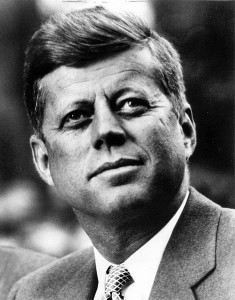 Last week’s 50th anniversary of President Kennedy’s assassination in Dallas, Texas marked a day that remains shrouded in dark mystery in modern American and world history. I spoke to our high school students about the Kennedy legacy at this week’s assembly because few had any sense of its context.
Last week’s 50th anniversary of President Kennedy’s assassination in Dallas, Texas marked a day that remains shrouded in dark mystery in modern American and world history. I spoke to our high school students about the Kennedy legacy at this week’s assembly because few had any sense of its context.
There are a lot of reasons that Kennedy and his assassination have left an indelible imprint on both American and Canadian psyches. At 43, he was the youngest president ever to be elected into office in 1960. He brought a youthful vigour to the presidency. He was also the first Catholic president; a big issue at the time because of fears that during his presidency he would be heavily influenced by the Vatican. This related especially to issues like access to birth control and the legal status of divorce.
Kennedy is also remembered for being the first “telegenic” president. An effective presenter on TV, he was perfectly suited to the short sound bites we have all become so accustomed to. Kennedy helped usher in the modern media age where it is no longer just content of the message that matters, but also how it’s presented. Today national leaders in the USA and Canada focus intensely on nationally- televised electoral debates that make or break their campaigns to win voters trust.
While in office, Kennedy actually was not successful on all fronts. However, his historical legacy has certainly been forged as one that addressed big issues. Many experts would describe his legacy as having had a focus on getting the country moving again and building optimism, hope and possibility in America and throughout the free world. In his famous inauguration speech in 1961 he made an important plea for Americans to commit to community service, stating, “ask not what your country can do for you, ask what you can do for your country.” This lead to the creation of the American Peace Corps and a new idealism that young Americans could lead through service in the poorest countries of the developing world.
Kennedy was also a close friend to African Americans and an advocate of proposed civil rights laws that would see greater equity in America, especially in the deep south which at the time was still very segregated.
The early 60s were also dominated by the Cold War nuclear standoff between the superpowers. During the tense 13-days of the Cuban Missile Crisis in 1962, Kennedy came under enormous pressure. He was surrounded by hawkish military advisors who insisted he respond forcefully to the presence of missiles in Cuba. During those intense days in October, Kennedy managed to avoid a nuclear conflict and was able to convince the Russians to remove their weapons from Cuba. Historians still consider his Cold War diplomacy a significant achievement.
Kennedy also initiated major spending on the space race with the Russians which eventually led to the Americans being the first to successfully put a man on the moon and literally reach for the stars.
When Kennedy was assassinated in November1963 his work was cut short. Many Americans wondered what he could have achieved, and the shooting represented a violent collision of hope and possibility with the reality of violence and sheer evil that also exists in the world.
The official version of the assassination concluded one gunman acted alone. However, multiple conspiracy theories still abound about whether larger forces were behind the killing. These include allegations against the mafia, the Russians, archconservatives fighting against Kennedy’s proposed new equality, and civil rights laws. We will probably never know; Kennedy’s death will likely remain shrouded in mystery.
But at the 50th anniversary ceremony last Friday in Dallas, presidential historian David McCulloch reminded the audience that Kennedy was a confident optimist who was eloquent with his words. Kennedy knew that words matter and those that come from the mouth of the president have a special capacity to inspire and change lives. Quoting from Kennedy’s famous “New Frontier” speech presented when he won the presidential nomination in 1960, McCulloch stressed that Kennedy focused on challenges not promises and appealed to the American people to focus on their pride in a world of possibilities.
Hope, pride and possibility: If those are the core of the Kennedy legacy, then we should all aspire to see that modern civic life embodies all three, whether in the USA or here in Canada. In essence, Kennedy’s message is timeless, because it is hope, pride and possibility that will carry each of our students forward as young leaders. I see them in action at school and beyond. I am proud to say that I have confidence in them as doers and in their capacity to help build a better tomorrow in Canada and globally.
—Chris Shannon, Headmaster
